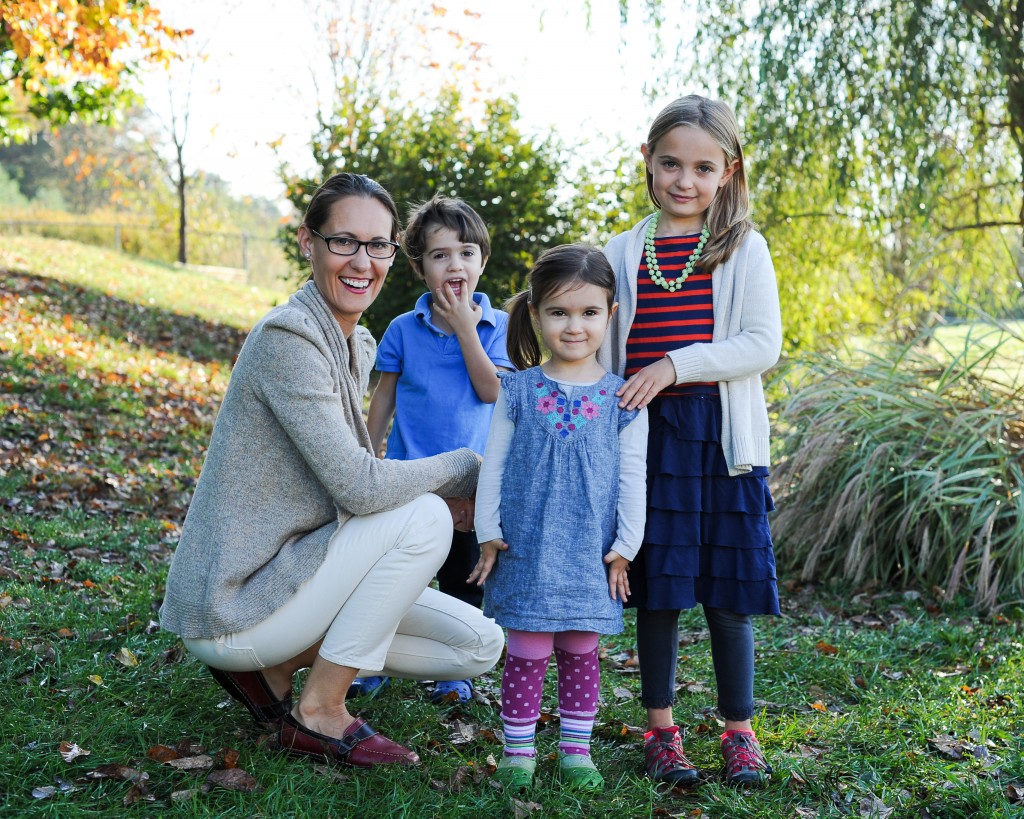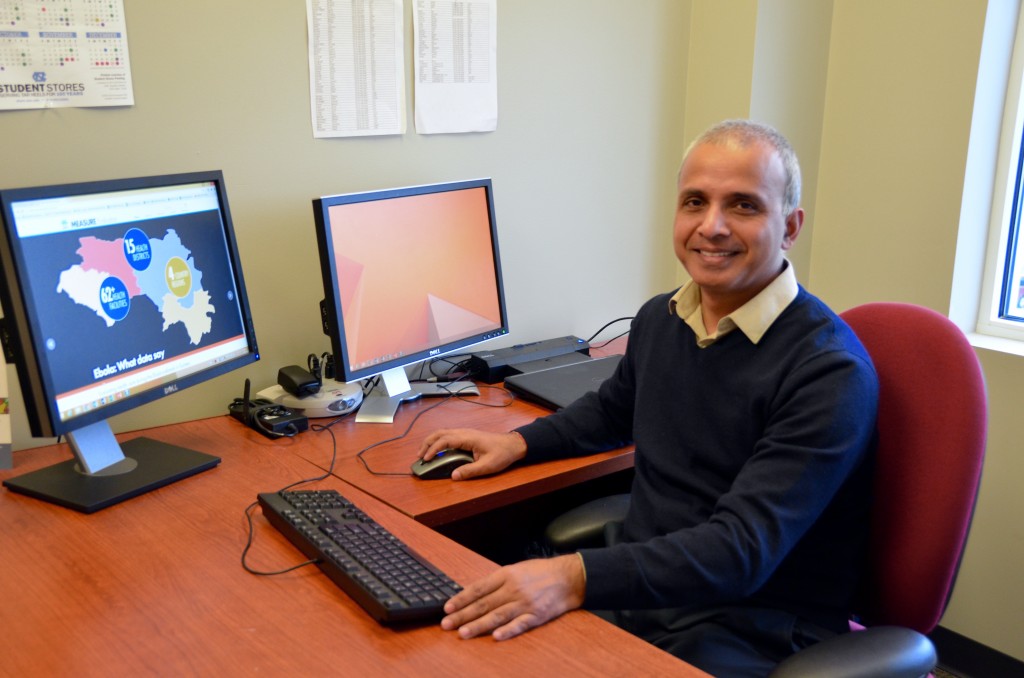Trajectories
May 5, 2016
Alumni from all eight academic units at the UNC Gillings School of Global Public Health prove themselves as local and global public health leaders.
.
Maternal and Child Health — Leigh Tally
Helping local governments in Africa use data better
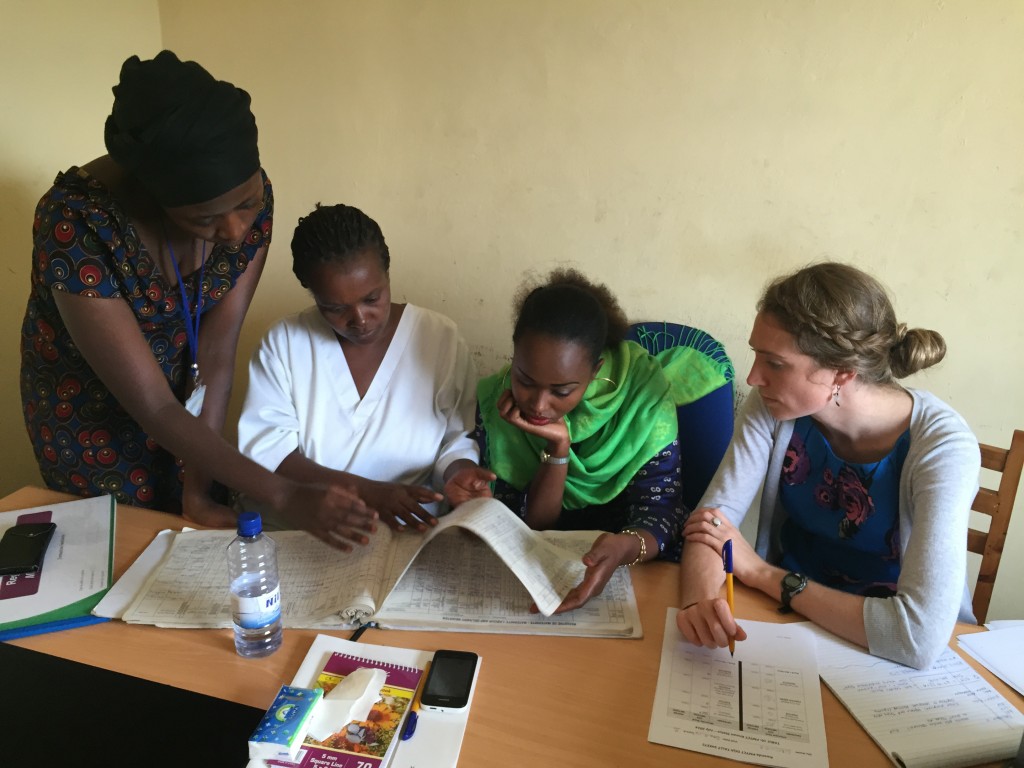
Leigh Tally (right) reviews information with staff members at Murara Health Center, in Rwanda. (Photo by Sara Forhan)
Leigh Tally, MPH, has a record of public health service that spans the globe.
As a graduate student, she served as a consultant to the Department of Health and Human Services in Raleigh, N.C., and volunteered as a malaria program specialist with the Peace Corps in Kisumu, Kenya.
These days, the 2014 alumna of the Gillings School’s maternal and child health department works full time at the Centers for Disease Control and Prevention (CDC) in Atlanta. As a member of a monitoring and evaluation team in the Division of Global HIV/AIDS and Tuberculosis, Tally spends nearly half her time in sub-Saharan Africa.
There, she supports the CDC’s country teams and local governments in strengthening monitoring and evaluation systems. With Tally’s help, the organizations can make more informed decisions by improving the application of data they collect.
“It’s not strategic information unless you are using it,” she notes.
“Not surprisingly, I am learning a lot in this role and really enjoying the challenge,” Tally says. “My experiences at the Gillings School inform my work on a daily basis. The School was great because I was surrounded by people who care about each other and the world around them.”
.
Biostatistics — Amy Richardson
An internship led to a great career
Public health led Amy Richardson, PhD, to Google.
It wasn’t her expected career path, but the 2014 alumna of the Gillings School’s biostatistics department landed a job after an internship with the technology giant during the final year of her doctoral program.
As a quantitative analyst in Google’s offices in Mountain View, Calif., Amy has a unique work environment. Her typical day involves a few hours of writing and testing code changes and updates to forecasting software, a few hours of data analysis to support decisions about back-end search algorithms and — naturally — a quick break to play a round of pool or an arcade game.
“I’d always believed Google had a positive impact on the world,” Richardson says. “I thought it would be fulfilling to work for such an organization, but I never really considered it as a possibility until my adviser, Dr. Michael Hudgens, encouraged me to pursue an internship. It turns out that a successful career at Google was very possible with my background in biostatistics.”
.
Health Policy and Management — Marie Callahan
Helping veterans access health care
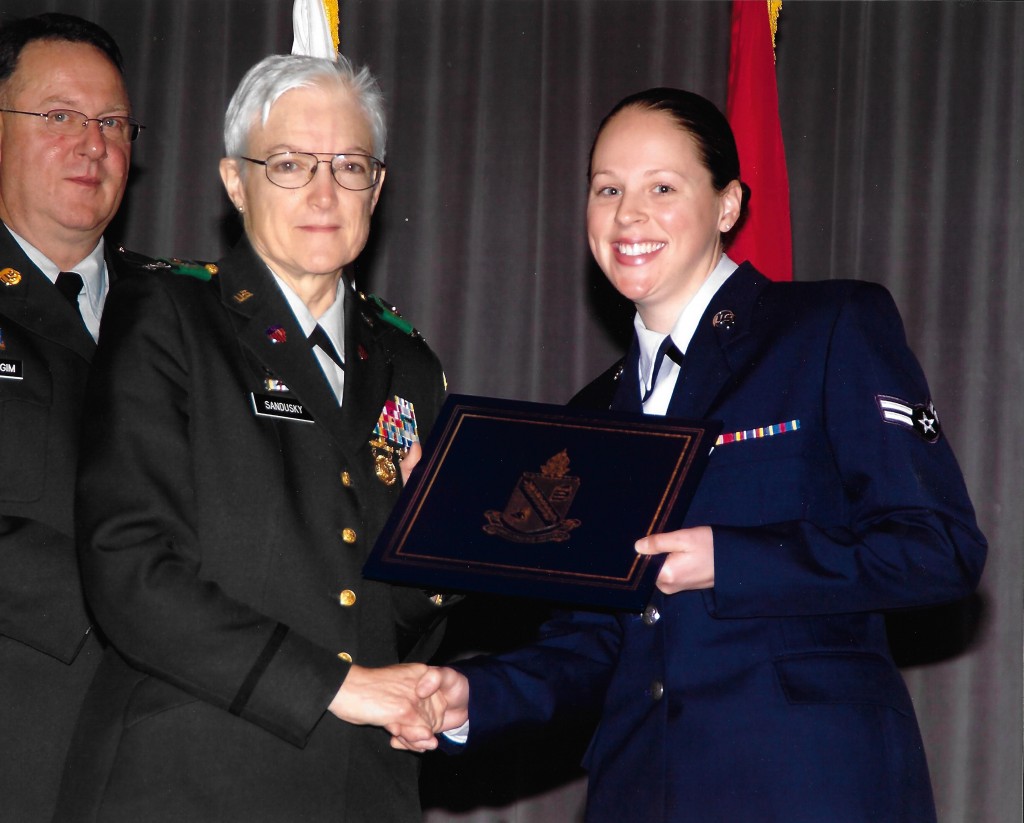
Marie Callahan (right) accepts a diploma at her Defense Language Institute graduation. (Contributed photo)
Marie Callahan, MSPH, RT(R), exemplifies personal passion for public health.
As administrative officer for care in the community at the Veterans Affairs (VA) Medical Center in Durham, N.C., Callahan coordinates care for veterans through the Veteran’s Choice Program. Through the program, veterans enrolled in a VA healthcare system can receive medical services in their own communities rather than having to travel to distant VA health centers.
Callahan chose her career based upon first-hand experience with veterans’ needs. From 2006 to 2008, she was a senior airman working as a Korean linguist in the U.S. Air Force — until an injury cut short her service. Experiencing chronic pain, she sought medical care through the VA, but was frustrated repeatedly by the system’s bureaucratic tangles.
Eventually, Callahan reached her limits. She applied to study in the Department of Health Policy and Management (HPM) at the UNC Gillings School.
“My goal,” she says, “was to put myself in a position to prevent fellow veterans from experiencing what I went through.”
Bruce Fried, PhD, HPM associate professor and director of the residential master’s program, says that active military personnel and veterans have studied in the department for more than 25 years; 24 active or veteran service people became HPM graduates in the last five years alone.
“During that time,” he says, “we have seen consistently how these individuals enrich the education of their fellow students.”
Callahan graduated from the Gillings School in May 2014. Today, it’s clear she has landed exactly where she needs to be.
.
Nutrition — Kiyah Duffey
Empowering families to make healthful choices
Kiyah J. Duffey, PhD, brings her entrepreneurial spirit to the field of nutrition.
Together with Lisa Sutherland, PhD, a fellow alumna of the Gillings School’s nutrition department, Duffey founded a company that aims to promote healthy lifestyles for families.
Announcing… Kizingo!
The company’s flagship product is a toddler spoon that helps children succeed at self-feeding. The idea for the spoon originated during Duffey’s years at the Gillings School.
In 2009, she completed her doctoral studies with adviser Barry Popkin, PhD, W.R. Kenan Jr. Distinguished Professor of nutrition. Together, they examined the relationship between diet and long-term health outcomes in adults. When Duffey began raising her family, she realized she would have more impact by focusing on children’s eating habits, as childhood is when adult patterns become ingrained.
These days, Duffey writes for a number of blogs and websites, including Mind Positive Parenting and Smart Eating for Kids, translating the latest nutrition science related to feeding young children. She also has founded Kiyah J. Duffey Consulting, which focuses on policy research that improves the health and well-being of children, their parents and caregivers.
“My vision,” she says, “is a world in which families are empowered to make food-related decisions that promote the health of the environment, their communities and their relationships. And we are doing this [at Kizingo] — one product at a time!”
.
Health Behavior — Jed Hinkley
Serving the people of northeastern North Carolina
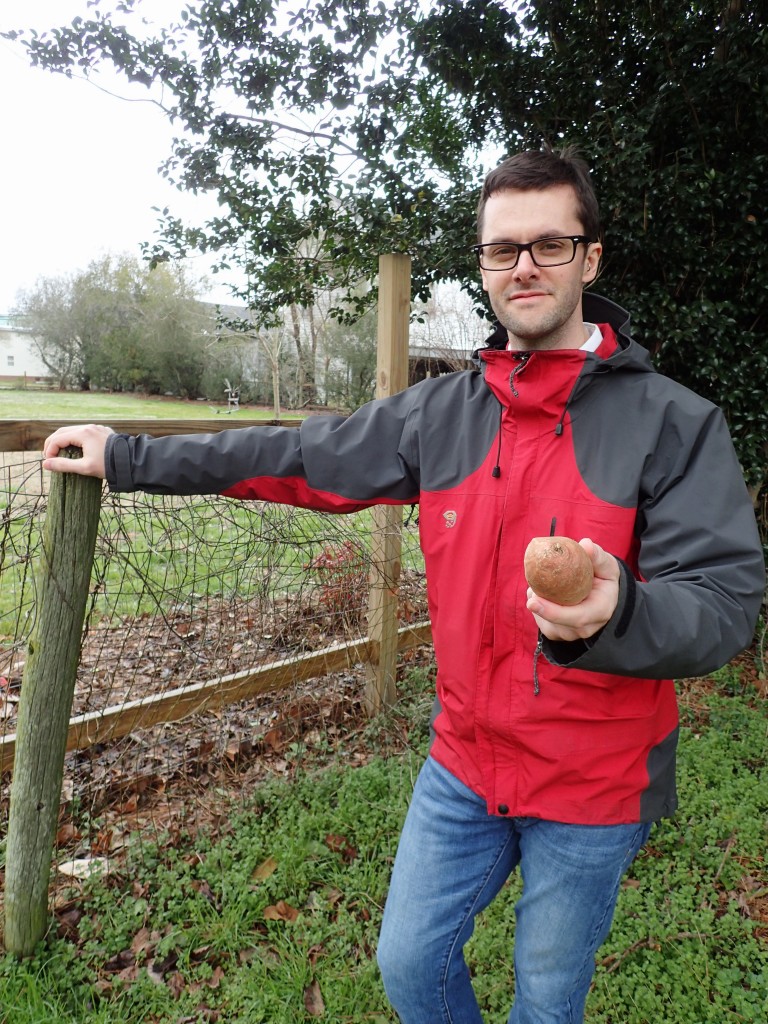
Jed Hinkley holds a sweet potato, one product of the farms and markets he often visits. (Contributed photo)
Jed Hinkley, MPH, is the “go-to” person if you want to talk about healthy food access in northeastern North Carolina.
As the healthy foods coordinator for Albemarle Regional Health Services, working with the Partnerships to Improve Community Health grant, Hinkley promotes equitable access to food. His efforts include initiatives that increase the number of local produce vendors and encourage vendors to accept the Supplemental Nutrition Assistance Program (SNAP).
A 2015 graduate of the Gillings School’s Department of Health Behavior, Hinkley now divides his time between the office and the field. He’s often in the car, visiting farms, markets and roadside stands throughout the 17 counties he supports.
“I wanted to work in a rural part of the state where significant health disparities exist, particularly in the areas of food access, physical activity, obesity and diabetes,” Hinkley says.
He felt compelled to apply to his current job out of desire to make a positive impact in a region where 15 of the 17 counties he serves are economically distressed. Almost all have obesity rates higher than 30 percent, and childhood poverty rates exceed 40 percent in some areas.
Hinkley says that every day at work, he applies the skills he learned as a master’s student.
“My studies at UNC Gillings gave me a good foundation in evaluation, methods and theory,” he says. “They also taught me the importance of ‘soft skills’ such as emotional intelligence and working with different types of people.”
When not on the road, Hinkley relaxes by spending time with his two young daughters. On nice days, he enjoys biking through the beautiful farmland he knows so well.
.
Epidemiology — Zachary Kerr
Finding support for himself and his skills at the NCAA
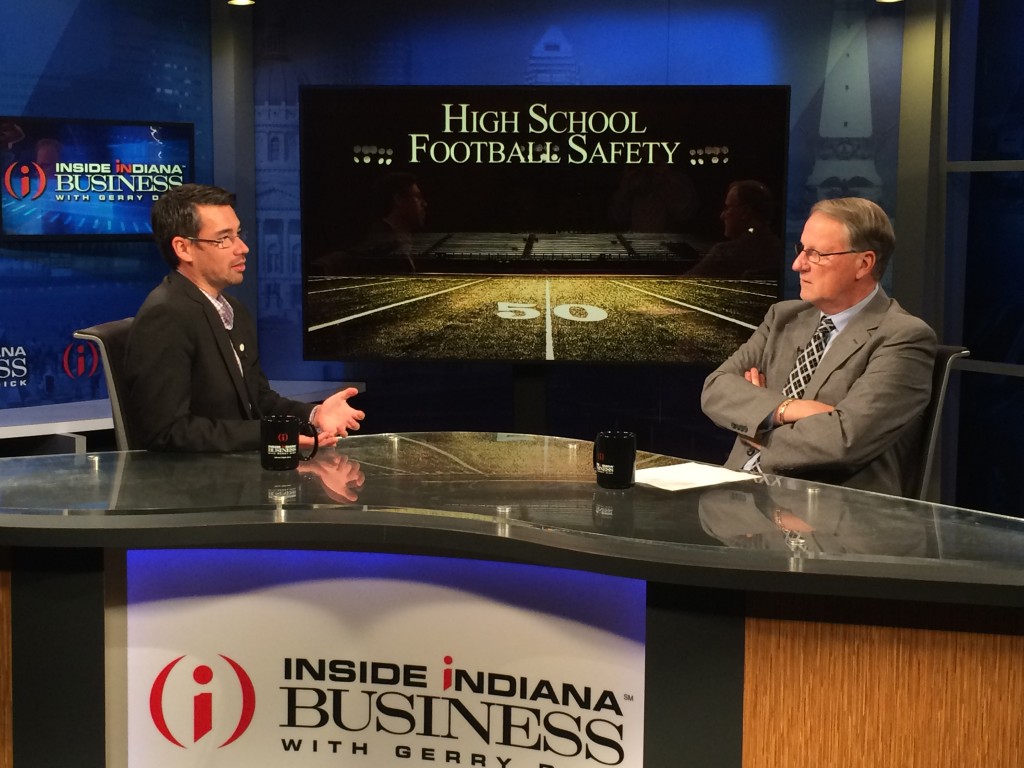
Dr. Zachary Kerr (left) discusses football injuries with host Bill Benner on Inside INdiana Business Televison. (Contributed photo)
Zachary Y. Kerr, PhD, was always picked last for sports teams at school. He finds that funny now that he works in the field of sports injury prevention.
Kerr is director of the National Collegiate Athletic Association (NCAA) Injury Surveillance Program at the Datalys Center for Sports Injury Research and Prevention.
“The job has provided me with a different outlook and a much greater respect for athletes, coaches and team medical staff,” he says.
After graduating in 2014 from the Gillings School’s Department of Epidemiology, he saw the posting for his current job and knew it would allow him to play a key part in the development of data-driven, evidence-based sports policy and programming.
Kerr has come a long way from the north shore of Maui, where he grew up. In addition to his professional achievements, he is personally proud to represent the LGBT community in a field with few LGBT-identified individuals.
“I have received respect and support from the NCAA and the Datalys Center,” says Kerr. “It’s the same supportive environment that made UNC so great. I was given the opportunity to enrich my experience in sports injury research in an environment that allowed me to be confident in my abilities and never feel ashamed of who I am.”
.
Public Health Leadership Program — Manish Kumar
Making a difference at MEASURE Evaluation
Manish Kumar, MPH, a native of India, has found a second home at UNC.
A seasoned public health professional, Kumar already had 12 years’ experience in project implementation and conducting activities to strengthen health systems at the point when a Rotary Peace Fellowship brought him back to school for a master’s degree.
After graduating from the Gillings School’s Public Health Leadership Program (PHLP) in 2015, he accepted research and teaching positions at UNC-Chapel Hill.
Kumar is senior technical specialist for health systems strengthening with MEASURE Evaluation — a USAID-funded global health information systems project housed within UNC’s Carolina Population Center.
In this role, he provides technical and capacity-building support for the Data for Accountability, Transparency and Impact Monitoring System managed by the United States government for teams in 50 developing countries.
As an adjunct assistant professor in the PHLP, Kumar also guides students through coursework, practicum activities and job searches.
His motivations are simple: “People are the reason that I work to strengthen health systems,” he says.
.
Environmental Sciences and Engineering — Alice Wang
Solving the puzzle makes public health fun
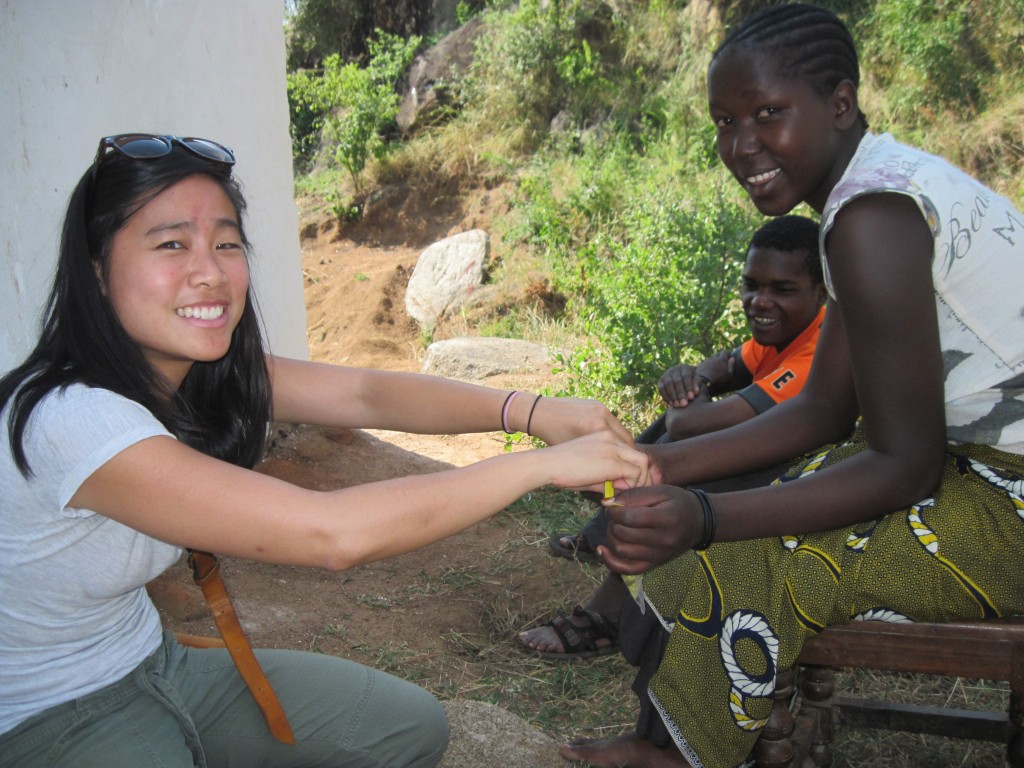
Dr. Alice Wang (left) shows a young woman in Mwanza, Tanzania, how to use a portable test for drinking water quality. (Contributed photo)
Alice Wang, PhD, has a great elevator speech.
“Have you seen the movie Contagion?” she asks. “Kate Winslet’s character was an epidemic intelligence service officer — that’s what I do!”
Wang, who graduated from the Gillings School’s environmental sciences and engineering program in May 2015, began working for the Centers for Disease Control and Prevention (CDC) that July. Her position is a two-year fellowship with a focus on applied epidemiology.
Her placement on the CDC’s disaster epidemiology and response team, part of the health studies branch of the National Center for Environmental Health, has afforded Wang the opportunity to engage with a variety of different projects and enhance her statistical analysis system (SAS) and geographical information system (GIS) skills.
On her latest international deployment, Wang traveled to Tanzania to help with cholera outbreak response. She spent two weeks in Dar es Salaam, working with the Ministry of Health and nonprofit partners to develop a water, sanitation and hygiene plan for rapid-response teams to share with local health offices.
Wang also traveled to the city of Mwanza for two weeks and visited households and cholera treatment centers to ensure that prevention and control measures were in place.
“A lot of what we did is common sense,” she explains, “but when limited by resources, hindered by politics and bogged down by logistics, the simplest tasks become challenges. Solving that puzzle is what makes public health fun.”
Most recently, the CDC deployed Wang to Flint, Mich., as part of the water response. “Responding to public health crises in our own country is very important, too,” she says.
—Jennie Saia
Carolina Public Health is a publication of the University of North Carolina at Chapel Hill Gillings School of Global Public Health. To view previous issues, please visit sph.unc.edu/cph.


